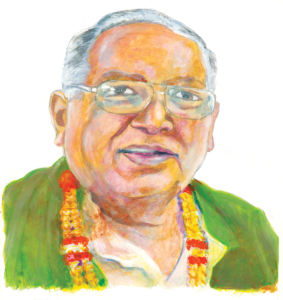
A great soul has left the body of Shri Satnarayan (“Sat”) Maharaj. In a small country, known internationally for its Carnival and Ramleela performances, Sat was a larger-than-life character on the national stage.
He has left many tangible and intangible legacies to the heritage of Trinidad and Tobago, including two books.
I was honoured to have been appointed by him as his personal, authorised biographer and writer. The first published book on him is entitled, Sat Maharaj: Hindu Civil Rights Leader of Trinidad & Tobago (2014). On the outside back cover, I wrote:
“Satnarayan (“Sat”) Maharaj is a religious and cultural leader in Trinidad and Tobago. He is the Secretary General of the Sanatan Dharma Maha Sabha, the major Hindu organisation in the multi-ethnic society. As much as he is criticised, Sat is also hailed as a champion of Hindus and Indians in the country. Moreover, he is described as the most influential and longest-serving Hindu spokesman outside of India.
“Sat struggled tirelessly to change the symbol of the nation’s highest award from the Trinity Cross to the Order of the Republic of Trinidad and Tobago. In the High Court, the Court of Appeal and the Privy Council, Sat fought against discrimination when the Maha Sabha was denied a radio broadcast licence by the Government. He has contributed significantly to national development in the fields of religion, education and culture.”
His rightful place in history
On the outside back cover, I chose the following quote from Dr Selwyn Cudjoe, Professor of Africana Studies at Wellesley College in Massachusetts, USA, as an endorsement of Sat:
“I … wish to congratulate Sat Maharaj for the herculean efforts he has made to improve the educational standards of his people, and his determination to ensure that his people receive their rightful share of the national pie. When the history of the second half of the twentieth century is written, I am certain he will take his place as one of the more outstanding Trinbagonians of the era.”
On one of the first few pages, I chose to publish an endorsement of the book itself from Dr Dimitris Michalopoulos of the Institute for Historical Studies Athens in Greece. He wrote: “In addition to the great Greek and Armenian Diasporas, there is the Hindu Diaspora in the Caribbean; and although it is practically unknown to the vast, international public, there are many brilliant – and sometimes gloomy – aspects to it.
“In this book, one can read about the modern saga of the Hindu community’s evolution in Trinidad and Tobago. Through the story of the life of Satnarayan Maharaj, the local leader, the reader is able to follow the rise of a people from the insignificance of unmerited obscurity to the splendour of extraordinary success.”
The Hindu View of Trinidad and Tobago
The second book that Sat commissioned is entitled, The Hindu View of Trinidad and Tobago:
Selected articles by Sat Maharaj (2016). It comprises a collection of his newspaper columns which were originally published in the Express, Newsday and Guardian, the three daily newspapers in the island.
These selected weekly columns span a period of 20 years from 1996 to 2016. This first volume consists of 108 articles organised thematically into eight sections: Culture, Religion, Politics, Education, History, Icons, Society and the Maha Sabha. The articles address communal, national, regional and international issues that should be of interest to general readers as well as researchers and scholars.
In the Introduction, I wrote: “Under the leadership of Mr. Sat Maharaj, the Maha Sabha manages 43 primary and 5 secondary schools as well as 20 early childhood centers. It also governs 225 temples, a radio and TV station (Jaagriti), a bi-monthly magazine (Mukdar) and a museum. The Maha Sabha also has a number of committees (e.g. Scouts and Sports) and organises a number of events (e.g. Ramleela, Phagwa, Indian Arrival Day and Baal Vikaas Vihar).
“With Sat at the forefront, the Maha Sabha is the most proactive, assertive and vocal Hindu organisation in Trinidad and Tobago and the Caribbean …. Although he is 85 years old, Sat still fights tirelessly for equal rights for Hindus and Indians in Trinidad and Tobago. Before he leaves this material world, he wants to add one more institution to the landscape.
“It will be the Maha Sabha’s Hindu Home for the Elderly, complete with a temple and the most modern health care facilities. As an administrator of an educational-cum-religious institutions, Sat wants to file a case against the University of the West Indies (UWI) to compel it to offer a BA in Hindu Studies in the same way it has been offering a degree in Christian Theology for decades with taxpayers’ revenue.”

is a full-time anthropologist at the University of Guyana (UG) and Fellow of The Eccles Centre for American Studies, British Library (2022-23). He is a former Assistant Professor at the University of Trinidad and Tobago (UTT). He obtained his Ph.D. in Anthropology from the University of Florida (UF). As a doctoral student, he won a Florida Caribbean Institute Award, an A. Curtis Wilgus Grant, and an Organization of American States (OAS) Fellowship.
Mahabir received a National Award (Hummingbird Silver Medal) for his contribution to education in his country in 2011. He was among 50 recipients who received a Distinguished Alumni Award from the UWI Alumni Association.
Mahabir is the author of 12 books to date.
